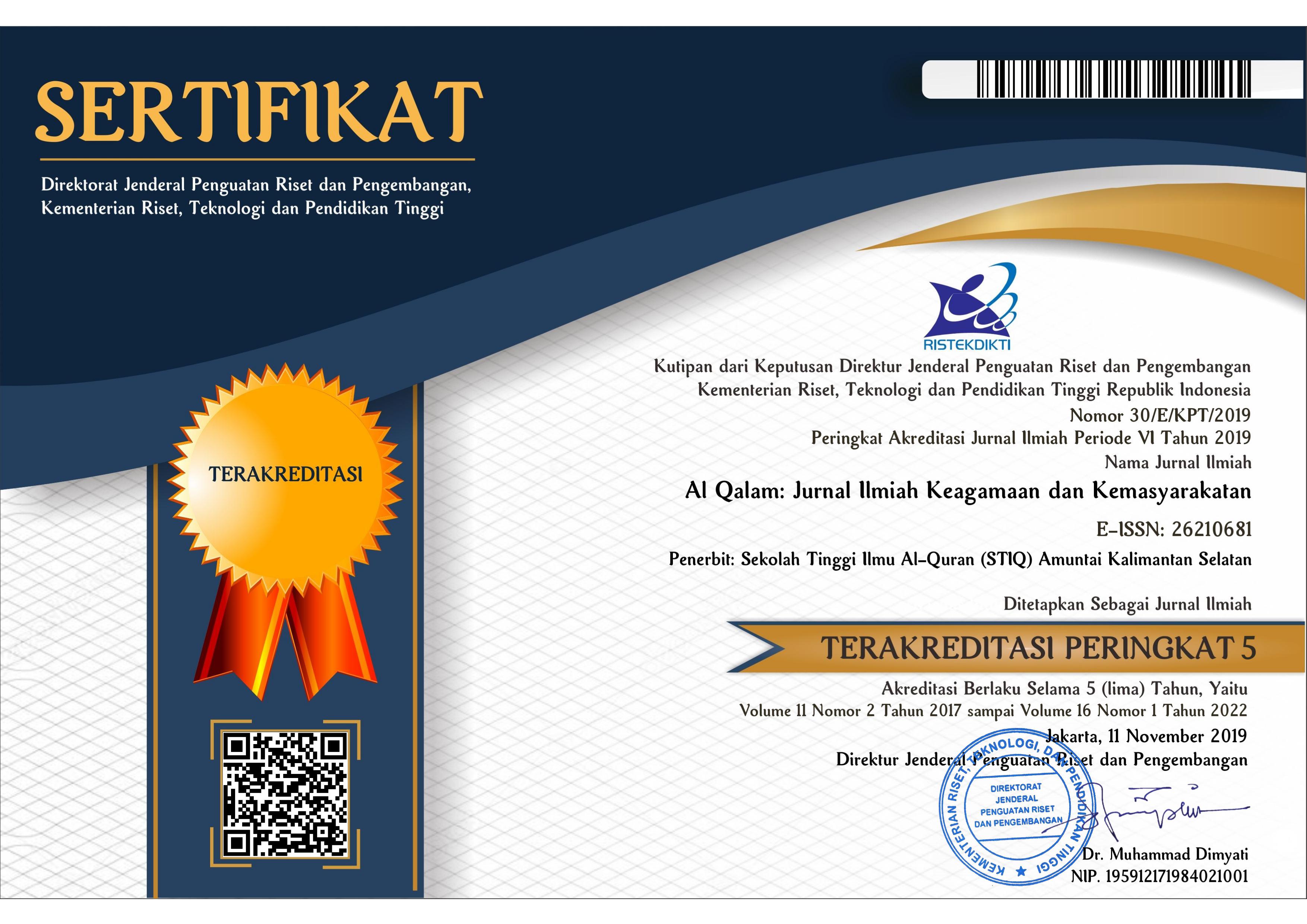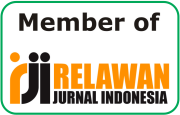Childfree from the Perspective of Islamic Feminism: An Analysis of the Thoughts of Amina Wadud and Asma Barlas
Abstract
The phenomenon of childfree, the decision not to have children, is increasingly becoming a concern in social discourse, especially in the context of modern society which is dominated by the concepts of gender justice and bodily rights. This article analyzes the issue of childfree from the perspective of Islamic feminism through the thoughts of Amina Wadud and Asma Barlas. The main focus of this article is to understand how these two thinkers interpret women's rights, especially regarding the freedom to choose their reproductive roles. Using a qualitative method based on literature study, this research asserts that Islamic feminism, as initiated by Wadud and Barlas, supports women's right to choose childfree as a form of bodily autonomy and moral freedom guaranteed in Islamic teachings. This article also seeks to criticize patriarchal interpretations that limit women to domestic roles. The results show that the childfree decision can be categorized as a form of women's liberation from social pressure that is not in accordance with the principles of justice and equality in Islam.
Keywords
Full Text:
PDFReferences
Audinovic, Vizcardine, and Rio Satria Nugroho. “Persepsi Childfree di Kalangan Generasi Zilenial Jawa Timur.” Jurnal Keluarga Berencana 8, no. 1 (2023): 1–11.
Barlas, Asma. Believing Women in Islam: Unreading Patriarchal Interpretations of the Qur’an. University of Texas Press, 2002.
Bryson, Valerie. Feminist Political Theory: An Introduction. Mc Millon, n.d.
Fakih, Mansour. Analisis Gender & Tranformasi Sosial. 16th ed. Pustaka Pelajar, 2024.
Fidhayanti, Dwi, Muhammad Muhammad, Mahbub Aunur Rofiq, et al. “Rethinking Islamic Feminist Thought on Reinterpreting the Qur ’ an : An Analysis of the Thoughts of Aminah Wadud , Fatima Mernissi , Asma Barlas , and Riffat Hassan Introduction In the Modern Context , the Debate on Women ’ s Roles and Rights in Islam Has.” Tribakti: Jurnal Pemikiran Keislaman 35, no. 1 (2024): 37–56. https://doi.org/10.33367/tribakti.v35i1.4956 E-ISSN.
Fillaili, Nissa Ma’rifa. “Keluarga Sakinah Menurut Prespektif Al- Qur ’ an.” INNOVATIVE: Journal Of Social Science Research Volume 3, no. 2 (2023): 2681–94.
Gillespie, Rosemary. ““Childfree and Feminine: Understanding the Gender Identity of Voluntarily Childless Women.” Gender & Society 17, no. 1 (2003): 122–36.
Haecal, M Irfan Farraz, Hidayatul Fikra, and Wahyudin Darmalaksana. “Analisis Fenomena Childfree Di Masyarakat: Studi Takhrij Dan Syarah Hadis Dengan Pendekatan Hukum Islam.” Gunung Djati Conference Series 8, no. 2 (2022): 219–33.
Haganta, Karunia, Firas Arrasy, and Siamrotul Ayu Masruroh. “Manusia, Terlalu (Banyak) Manusia: Kontroversi Childfree di Tengah Alasan Agama, Sains, dan Krisis Ekologi.” Prosiding Konferensi Integrasi Interkoneksi Islam dan Sains 4 (2022): 309–20. https://ejournal.uin-suka.ac.id/saintek/kiiis/article/view/3189.
Hanandita, Tiara. “Konstruksi Masyarakat Tentang Hidup Tanpa Anak Setelah Menikah.” Jurnal Analisa Sosiologi 11, no. 1 (2022): 126–36. https://doi.org/DOI: https://doi.org/10.20961/jas.v11i1.56920.
Harrington, Rebecca. “Childfree by Choice.” Studies in Gender and Sexuality 20, no. 1 (2019): 22–35. https://doi.org/10.1080/15240657.2019.1559515.
Herwan, Herwan, Jasmansyah Jasmansyah, Harapandi Dahri, and Irfan Sofian. “Childfree in Islamic Persfective.” Proceedings of the International Conference on Education, Humanities, and Social Science, no. ICEHoS 2023 (2023). https://doi.org/10.2991/978-2-38476-249-1.
Ilham, Muhammad. “Telaah Maqashid Al-Syari'ah Fenomena Childfree.” Indonesian Journal of Shariah and Justice (IJSJ) 3, no. 2 (2023): 197–220. https://doi.org/10.46339/ijsj.v3i2.71.
Ma’mun, Sukron, Sheikh Adnan Ahmad Usmani, and Ibnu Akbar Maliki. “Childfree Phenomenon Among Urban Muslims: A Multidisciplinary Examination of Science and Morality.” Akademika: Jurnal Pemikiran Islam 28, no. 01 (2023): 111–24. https://doi.org/10.32332/akademika.v28i1.6773.
Marwing, Anita, and Yunus. Perempuan Islam dalam Berbagai Perspektif: Politik, Pendidikan, Psikologi, Ekonomi, Sosial, Budaya. Bintang Pustaka Madani, 2021.
Moulet, Christine Beatrix. Neither’less’ or’free’: A Long-Term View of Couple’s Experiences and Construction of Involuntary Childness. Australian Catholic University, 2005.
Muzzammil, Iffah. Fiqh Munakahat Hukum Pernikahan Dalam Islam. Tsmart Printing, 2019.
Nabila, Wijdatun, Hasna Al Jauza, Inas Nur Faizah, et al. “A Feminist Study of the Childfree Trend in Generation Z : A Normative Review.” SICOPS: Solo International Collaboration and Publication of Social Sciences and Humanities 2, no. 2 (2024): 143–58. https://doi.org/10.61455/sicopus.v2i02.142 A.
Nallanie, Farrencia, and Fhelincia Nathanto. “Childfree di Indonesia, Fenomena atau Viral Sesaat?” Journal Syintax Idea 6, no. 06 (2024): 2663–73. https://doi.org/10.36418/syntax-idea.v3i6.1227.
Ningrum, Wafa Suci. “( Studi Gender Tentang Feminisme Liberal Dan Feminisme Radikal ).” FAMILIA: Jurnal Hukum Keluarga 5, no. 1 (2024): 25–36. https://doi.org/10.24239/familia.v5i1.197.
Patnani, Miwa, Bagus Takwin, and Winarini Wilman Mansoer. “Bahagia Tanpa Anak? Arti Penting Anak Bagi Involuntary Childless.” Jurnal Ilmiah Psikologi Terapan 9, no. 1 (2021): 117–32. https://doi.org/10.22219/jipt.v9i1.14260.
Ramadhan, Abdul Rahman. “Reproductive Rights and Childfree in Islamic Law : A Juridical and Social Analysis.” Proceeding International Conference on Religion, Science and Education 4 (2025): 975–82.
Ramazoglu, Caroline. Feminism and Contradiction. Routlegde, 1989.
Shabrina, Amimah, Putri Prasmono, Mujiati Dwi Kartikasari, Amimah Shabrina, Putri Prasmono, and Mujiati Dwi Kartikasari. “The Childfree Phenomenon in Indonesia : An Analysis of Sentiments on YouTube Video Comments The Childfree Phenomenon in Indonesia : An Analysis of Sentiments on YouTube Video Comments.” JAMBURA : Journal Of Mathematics 6, no. 1 (2024): 29–38. https://doi.org/10.37905/jjom.v6i1.23591.
Siswanto, Ajeng Wijayanti, and Neneng Nurhasanah. “Analisis Fenomena Childfree Di Indonesia.” Bandung Conference Series: Islamic Family Law 2, no. 2 (2022): 64–70. https://doi.org/10.29313/bcsifl.v2i2.2684.
Tunggono, Victoria. Childfree and Happy. Mustika, 2021.
Turtle, Lisa. Encyclopedia of Feminisme. Facts of File Publication, 1986.
Umar, Nasaruddin. Argumen Kesetaraan Jender Perspektif Al-Perempuan Islam Dalam Berbagai Perspektif Qur’an. 2nd ed. Paramadina, 2001.
Wadud, Amina. Qur’an and Woman: Rereading the Sacred Text from a Woman’s Perspective. Oxford University Press, 1992.
Wardana, Wisnu, and Faisar Ananda. “Hukum Pernikahan Dalam Perspektif Di Dunia Islam.” INNOVATIVE: Journal Of Social Science Research Volume 4, no. 1 (2024): 4472–87. https://doi.org/10.31004/innovative.v4i1.8388.
Yusuf, Maulana. “Childfree Perspektif Feminisme (Studi Analisis Ditinjau dari Worldview Islam).” Yustisi: Jurnal Hukum & Hukum Islam 11, no. 1 (2024): 45–62. https://doi.org/10.32832/yustisi.v11i1.16191.
Zarkasyi, Hamid Fahmy. Misykat: Refleksi Tentang Westernisasi, Liberalisasi, Dan Islam. 2nd ed. INSIST-MIUMI, 2012.
DOI: http://dx.doi.org/10.35931/aq.v19i6.5657
Refbacks
- There are currently no refbacks.
Copyright (c) 2025 Afidatul Khasanah, Rajabbul Amin

This work is licensed under a Creative Commons Attribution 4.0 International License.
Al Qalam: Jurnal Ilmiah Keagamaan dan Kemasyarakatan
index by:
Publish by:
Sekolah Tinggi Ilmu Al-Qur'an Amuntai
Contact us:
Address: Jl. Rakha Pakapuran, Amuntai Utara
Kabupaten : Hulu Sungai Utara
Kode Pos : 71471
Provinsi : Kalimantan Selatan
Telephone : 085251613000
Email: hafizhihusinsungkar@gmail.com

This work is licensed under a Creative Commons Attribution 4.0 International License


